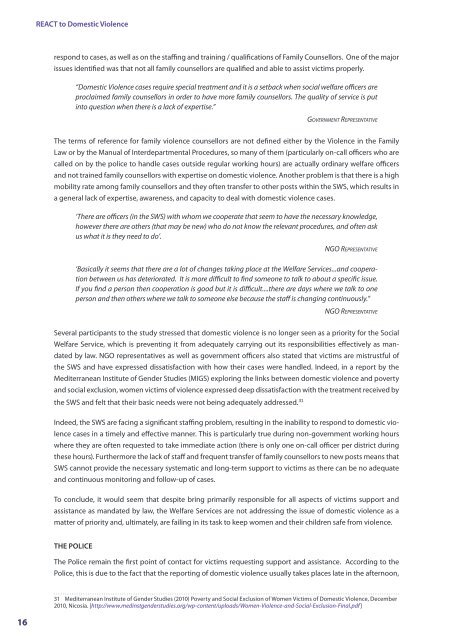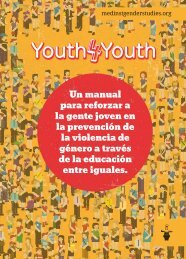react to domestic violence
react to domestic violence
react to domestic violence
Create successful ePaper yourself
Turn your PDF publications into a flip-book with our unique Google optimized e-Paper software.
REACT <strong>to</strong> Domestic Violence<br />
respond <strong>to</strong> cases, as well as on the staffing and training / qualifications of Family Counsellors. One of the major<br />
issues identified was that not all family counsellors are qualified and able <strong>to</strong> assist victims properly.<br />
“Domestic Violence cases require special treatment and it is a setback when social welfare officers are<br />
proclaimed family counsellors in order <strong>to</strong> have more family counsellors. The quality of service is put<br />
in<strong>to</strong> question when there is a lack of expertise.”<br />
Government Representative<br />
The terms of reference for family <strong>violence</strong> counsellors are not defined either by the Violence in the Family<br />
Law or by the Manual of Interdepartmental Procedures, so many of them (particularly on-call officers who are<br />
called on by the police <strong>to</strong> handle cases outside regular working hours) are actually ordinary welfare officers<br />
and not trained family counsellors with expertise on <strong>domestic</strong> <strong>violence</strong>. Another problem is that there is a high<br />
mobility rate among family counsellors and they often transfer <strong>to</strong> other posts within the SWS, which results in<br />
a general lack of expertise, awareness, and capacity <strong>to</strong> deal with <strong>domestic</strong> <strong>violence</strong> cases.<br />
‘There are officers (in the SWS) with whom we cooperate that seem <strong>to</strong> have the necessary knowledge,<br />
however there are others (that may be new) who do not know the relevant procedures, and often ask<br />
us what it is they need <strong>to</strong> do’.<br />
NGO Representative<br />
‘Basically it seems that there are a lot of changes taking place at the Welfare Services...and cooperation<br />
between us has deteriorated. It is more difficult <strong>to</strong> find someone <strong>to</strong> talk <strong>to</strong> about a specific issue.<br />
If you find a person then cooperation is good but it is difficult....there are days where we talk <strong>to</strong> one<br />
person and then others where we talk <strong>to</strong> someone else because the staff is changing continuously.”<br />
NGO Representative<br />
Several participants <strong>to</strong> the study stressed that <strong>domestic</strong> <strong>violence</strong> is no longer seen as a priority for the Social<br />
Welfare Service, which is preventing it from adequately carrying out its responsibilities effectively as mandated<br />
by law. NGO representatives as well as government officers also stated that victims are mistrustful of<br />
the SWS and have expressed dissatisfaction with how their cases were handled. Indeed, in a report by the<br />
Mediterranean Institute of Gender Studies (MIGS) exploring the links between <strong>domestic</strong> <strong>violence</strong> and poverty<br />
and social exclusion, women victims of <strong>violence</strong> expressed deep dissatisfaction with the treatment received by<br />
the SWS and felt that their basic needs were not being adequately addressed. 31<br />
Indeed, the SWS are facing a significant staffing problem, resulting in the inability <strong>to</strong> respond <strong>to</strong> <strong>domestic</strong> <strong>violence</strong><br />
cases in a timely and effective manner. This is particularly true during non-government working hours<br />
where they are often requested <strong>to</strong> take immediate action (there is only one on-call officer per district during<br />
these hours). Furthermore the lack of staff and frequent transfer of family counsellors <strong>to</strong> new posts means that<br />
SWS cannot provide the necessary systematic and long-term support <strong>to</strong> victims as there can be no adequate<br />
and continuous moni<strong>to</strong>ring and follow-up of cases.<br />
To conclude, it would seem that despite bring primarily responsible for all aspects of victims support and<br />
assistance as mandated by law, the Welfare Services are not addressing the issue of <strong>domestic</strong> <strong>violence</strong> as a<br />
matter of priority and, ultimately, are failing in its task <strong>to</strong> keep women and their children safe from <strong>violence</strong>.<br />
THE POLICE<br />
The Police remain the first point of contact for victims requesting support and assistance. According <strong>to</strong> the<br />
Police, this is due <strong>to</strong> the fact that the reporting of <strong>domestic</strong> <strong>violence</strong> usually takes places late in the afternoon,<br />
31 Mediterranean Institute of Gender Studies (2010) Poverty and Social Exclusion of Women Victims of Domestic Violence, December<br />
2010, Nicosia. [http://www.medinstgenderstudies.org/wp-content/uploads/Women-Violence-and-Social-Exclusion-Final.pdf]<br />
16







